- Home
- Jack Canfield
Chicken Soup for the Soul Christmas Page 14
Chicken Soup for the Soul Christmas Read online
Page 14
They explained that it had originally started as a gentle prank about Grandpa’s dubious pear-growing attempts.
When they witnessed the joy that the mystery gave him, they were compelled to carry it on year after year. To do this over the years had required enormous creativity and planning, and Marshall and Twyla had enlisted the help of many others throughout the world to help them carry on their loving gift of holiday joy and mystery.
Jeff S. Hamilton
The Last Christmas
Christmas is supposed to be a time of peace and joy on Earth, a time of giving and warmth. Many of my friends and acquaintances celebrate the day, the birth of Jesus, at church, followed by a sumptuous meal and opening gifts under the Christmas tree. Still others celebrate the day by helping those who are less fortunate at various food banks, shelters, or hospitals.
I will never forget one special Christmas. I work at Memorial Hermann Hospital, primarily in the Neuro Trauma Intensive Care Unit. Being Jewish, I also worked in other units of the hospital that day so that my Christian coworkers could spend time with their families at home on Christmas.
Walking through the large hospital, I saw several sad families in the many waiting rooms that day. I could imagine them all screaming, “What kind of Christmas is this—spending it at the hospital?” However, when I knocked on room 623 (Mrs. Hunter’s room on the oncology floor), I soon learned that everything is relative.
“Hi, my name is Mike Segal from Case Management. Is there anything I can do to help you? May I come in?” I asked those questions to an eighty-seven-year-old cancer patient who, according to the chart, would soon be transferred to a hospice so she might live out the remaining weeks of her life more peacefully.
Her daughter Mary said, “Please come in.”
As I entered the room, Mrs. Hunter uttered in a soft, hoarse voice, “I still need a straw.”
Mary quickly interjected, “They delivered this Ensure for Mom, but they did not bring a straw. We asked the nurse for a straw a few minutes ago, but this is Christmas, and I don’t know when the nurse will bring it.”
I excused myself from the room, told the nurse what I was doing, and rushed down to the cafeteria where I grabbed a handful of straws. Knocking on the door again, I was greeted by Mary’s huge smile as she saw what was in my hand.
“Thank you so much. It seems so small, but for Mom the straw is such an important thing,” Mary said as she put the straw into the Ensure that her mother quickly began drinking. Mary then wished me a Merry Christmas.
I replied, “May you all have a very peaceful Christmas, too. Before I go, is there anything else I can do?”
With those words, Mrs. Hunter quickly asked in a soft voice, “Can we sing some Christmas carols?”
That question startled me as I wasn’t sure if I knew the words to any carols, but I quickly replied, “Of course. I’d love to.”
Mrs. Hunter automatically started singing “Jingle Bells,” and I quickly joined in, followed by her daughter. Afterward, we sang two more Christmas songs.
Some Jewish people might be asking, “How can you, as a Jew, sing Christian songs?” However, for me the answer was crystal clear. Judaism believes in the sanctity of life.
If I could do anything to help Mrs. Hunter enjoy her last Christmas, I was going to do it. The preservation of life takes precedence over everything else in Judaism, and it may be interpreted in many different ways. That day, I interpreted it as bringing a smile to the face of a dying woman.
As we concluded our songs, Mary, with tears in her eyes, said, “Thank you so much. God bless you and Merry Christmas.”
“Merry Christmas to you and your family as well,” I replied, feeling the true spirit of the holiday’s season.
Michael Jordan Segal
Reprinted by permission of Jonny Hawkins. © 2007 Jonny Hawkins.
Unexpected Guests
Each day comes bearing its own gifts.
Untie the ribbons.
Ruth Ann Schabacker
I was six thousand miles away from home on that snowy Christmas Eve in 1981, but it felt like a million. I didn’t look forward to the holidays; it was only my second away from the family. For that reason, my buddy Chris and I strolled through the mountain village of Ulmen on our way to the club at the base in search of something to do. We were a couple of U.S. airmen assigned to a squadron on a German Air Force base as a NATO partnership. It was still the Cold War.
As we walked by a small stone house, Chris stopped and exclaimed, “Hey, this is Reiner and Ilona’s house!”
Who the heck are Reiner and Ilona? I thought. And why would they want us dropping by unannounced on Christmas Eve?
Enthusiastically, Chris rapped on the door several times. I stood a distance behind him. I wasn’t sure whether they’d appreciate unexpected guests. Slowly, the door opened, and there stood a young man wearing glasses. “Ah, Chris!” he exclaimed. “Come in!”
“Reiner, I have a friend,” Chris said as he gestured back to me.
“That’s okay, I’ll wait for you here,” I said, not wanting to impose.
“Ah, nonsense,” the young man replied. “A friend of Chris is a friend to us. Come in! Come in!”
“Hello,” I said as I entered. “I’m Larry.”
“Hello,” the young man replied. “I am Reiner.”We shook hands firmly.
Reiner was a young man with a soft demeanor, wearing steel-framed glasses and a gentle face. I soon discovered he had been a member of the German Air Force for several years and was also stationed at the base.
As I reluctantly entered the house, I found it beautifully decorated for the season. In fact, the home seemed to have a yuletide scent. I said nothing, but in my heart I let out a resounding, Wow!
“Come, Ilona is in the kitchen,” Reiner said as he waved us along. As we reached the dining room, the aroma was unmistakably that of someone preparing dinner.
“Ilona,” Reiner called out, “wir haben Besuch.”
From the kitchen emerged a beautiful young woman with a slender build, auburn hair, and a warm smile. “Ah, Chris! Hello!” She embraced Chris and kissed him on the cheek. Over his shoulder, she noticed me donning a nervous smile.
“Ah, hello,” she said. She walked over to me, shook my hand, and asked, “What is your name?”
“Larry,” I answered nervously.
“Welcome to our home,” she said. “If you are a friend of Chris, you are our friend, too.” I smiled. She insisted we take off our coats, sit down, and relax. She disappeared for a moment, and returned with holiday glasses and a bottle of Riesling wine, produced in the region. She filled the glasses and handed them out. Then, Reiner raised his glass to propose a toast: “For friendship. You are always welcome in our home.”
With a raised glass, I replied, “Thank you.”
“Frohe Weihnachten,” Ilona added.
“Merry Christmas,” I replied, signaling I understood.
“Prost!” Reiner exclaimed, the German equivalent for “Cheers!”
We all sat down and immersed ourselves in pleasant conversation. I was eager to learn as much about my hosts as I could. But when they learned I was from California, they only wanted to know about the beaches, the weather, and the many things they had heard.
“Is it true that it never rains there?” Reiner asked.
Sadly, I had to dispel all myths. They seemed disappointed.
Then, Ilona excused herself for a moment as we continued to talk. When she returned, she said, showing her warm smile, “You must stay for dinner.”
“Oh, no,” I said. “We can’t do that.”
She walked over to me, bent over as she lightly touched my hands, and repeated it gently, “You must stay for dinner.”
“You mustn’t argue,” Reiner said with a smile. “She always wins.”
We were guided to the dining-room table, which was now set for four. Reiner motioned for us to sit, and soon Ilona appeared with a bowl of light soup for each of us. I bowed
my head and silently said grace. This was a habit I had acquired as a child and now didn’t seem like a time to break it. I was truly thankful.
“Is everything okay?” Reiner asked.
“Yes,” I replied with a broad smile. “Everything is perfect.”
Ilona sat down, and we all began to eat. Then, as if on schedule, she replaced our bowls with a course of roasted turkey and gravy, accompanied by vegetables. The unique flavor made me pause between bites to appreciate every taste. As I ate the last spoonful of my dinner, I was quite full—and satisfied. What a wonderful meal! I not only experienced a delicious dinner but I spent the evening with two giving people who opened their home—and their hearts—to two lonely American servicemen.
When we returned to the living room, we drank more wine, enjoyed more interesting chatter, and listened to soft music. Occasionally, Ilona would disappear into the kitchen for a few minutes, then return. Assuming she was cleaning, I offered my assistance. She brushed away the offer with a polite “No, thank you.”
Then something sad happened—the night had to end.
“Would you like me to take you there?” Reiner asked.
“No,” Chris answered. “It’s a nice night.”
“Moment,” Ilona said as she ran into the kitchen.
She returned with two small wrapped baskets. Later, we’d discover they were filled with chocolates, cookies, and pastries. “This is for you,” she said, presenting one to each of us.
As we bid the couple farewell, Ilona warmly said to me, “You welcome in our home anytime.” I soon learned that wasn’t just hollow politeness. There were more countless dinners, parties, and conversations over coffee and cake in our future. We all became very good friends.
That Christmas turned out to be the best I could have hoped for.
Lawrence D. Elliott
Oh, Christmas Tree
I grew up on the grounds of Folsom Prison, where my father worked for nearly two decades. During my childhood, trustees—inmates who were not considered a threat—were a constant; it was their responsibility to keep the grounds looking nice.
One January, I was sick and laying on the living-room couch, barely able to keep food down. In an adjacent room, our forlorn and very dried-out Christmas tree stood, awaiting removal. Mom had taken off the ornaments, but Dad had been too busy to drag the big tree out of the house.
Sitting on the couch and comforting me, Mom stared at the tree. She then stood up and went to the hallway, pulling several large sheets from the linen closet. She placed the sheets end-to-end, starting from the front door all the way to the huge tree. In total awe, I watched my mother wrestle and drag the very dead tree across the sheets to the front door. The tree shed nearly every needle onto the sheets during its journey. She then heaved the tree out the front door with great aplomb, throwing it onto the walkway.
By this time, I was off the couch, watching Mom and offering any moral support I could in my sickly state. She asked me to fetch a hammer. Dad never used a water stand for our Christmas tree but had “invented” his own stand, using two heavy wooden slats nailed to each other in an X-like fashion, with the middle then nailed to the base of the tree. Mom knew she had to remove the wooden stand for next year’s tree.
The only hammer I could find in the junk drawer was a small one, which I took to her. With one foot atop the tree’s trunk, Mom hit the wooden stand with the small hammer, to no avail. I stood in the doorway watching and cheering her on. It was then we heard a man’s voice. Out in the street stood a trustee.
“Um, ’scuse me, Mrs. Johnson. Would you be needin’ some help?” he asked. In his fifties or so, the trustee had a deep Southern accent.
Mom said yes, explaining that she was having trouble getting the wooden stand off, and that Mr. Johnson very much needed the stand for next year’s Christmas tree.
“Why, I can fetch a bigger hammer from the shed and take that right off for ya,” he responded. Mom thanked him and asked that he leave the stand on the front porch.
I opened the screen door for her, and she started to come into the house.
“That’s right fine, Mrs. Johnson,” he said, then asked with some concern, “but when I get the stand off, where do you reckon Mr. Johnson wants me to plant the tree?”
At that point, Mom was facing me. She stared at me and told me with her “Mom eyes” to not even think about laughing. With all the grace she could muster, she turned around and said, “Why, that’s okay. I don’t think we’ll use this tree next year for Christmas. If you could throw it in the trash, I would appreciate it.”
“I’ve never heard of someone throwing away a
Christmas tree,” the trustee said, shaking his head in disbelief. Then he asked, “Why, if it’s okay with you and Mr.
Johnson, can I have the tree?”
“Yes, you’re welcome to it,” Mom graciously replied.
With a huge smile on his face, and many “thank yous” in between, the trustee hoisted the brown and almost needleless tree over his shoulder and happily headed toward the prison’s tool shed, promising to return the wooden stand in a few minutes.
When Mom came back into the house, we burst out with laughter as soon as she could close the front door.We laughed even harder picturing Dad’s reaction had he come home to the tree expertly “planted” in his front yard.
But, most importantly, our lifeless Christmas tree had brought joy to another and created a hilarious family Christmas story for generations to come.
Dahlynn M Kowen
“It’s for my mommy. Can you gift wrap a hug?”
Reprinted by permission of Jonny Hawkins. © 2007 Jonny Hawkins.
The Morning Santa Came
A Christmas candle is a lovely thing;
It makes no noise at all,
But softly gives itself away;
While quite unselfish, it grows small.
Eva K. Logue
This Christmas was unlike any that I had ever known. The presents were under the tree arrayed in their majestic bows and shimmery wrapping paper. The nativity scene was proudly displayed, showing our tribute to the real meaning of Christmas. The snowmen boasted their presence all around the house. The only thing missing was us.
My husband and I work in a ministry for troubled teenagers. “Troubled” seems like such a nasty word— perhaps I should refrain from that and say, “Searching teenagers!”
Our boss had not spent Christmas with his family in six years, and now with two new grandchildren to celebrate with, it just seemed appropriate that this was the perfect year to spend Christmas away with his family. My husband and I were asked to spend the holiday with the students who could not go home for Christmas. It would be a sacrifice to break all family tradition, but one we were delighted to make.
I was not prepared for what this Christmas would have in store for us. I had already planned out the holiday feast menu and kept a variety of games to play. In the midst of singing Christmas carols, reading the Christmas story, making gingerbread houses, playing games, and feasting like kings, I felt as though there would be little time for quiet moments.
Every year since I was little, Santa had visited my grandparents’ house. I always sat on his lap, and he would give me my present while camera flashes went off everywhere. This year, my special tradition would be broken. It was the first time in twenty-six years I would not sit on Santa’s lap.
I went to bed on Christmas Eve thinking about our students. I began to put faces with stories, and it made me cry. These teenagers were searching for happiness, love, and hope. They were searching for someone to reach out to them—for someone to believe in them. I thought of the ones who had been victims of emotional, sexual, and physical abuse. Of those who had tried so many times to take their own lives. I thought of those who had never known the true meaning of Christmas, and of those who had never heard of the hope that the Savior brings.
I wanted them to wake up Christmas morning with joy and enthusiasm. I pulled something out
of a bag that my grandma had given me. It was perfect. It was exactly what I needed to make this Christmas memorable. I ran my fingers over the velvet material, eagerly anticipating my plans.
The next morning couldn’t arrive soon enough. I put on the velvet costume. My curly beard was a perfect match for my snow-white wig. I assembled the tray of hot cocoa and cookies and marched my way into the girls’ dormitory.
“Ho, Ho, Ho!!!” I exclaimed as I flipped on the lights.
Gasps and laughs were heard throughout the dorm.
“It’s Santa!!!” the teenage girls exclaimed.
Camera flashes filled the room. The girls eagerly came and posed for their pictures with Santa—bed heads and all.
The joy on their faces was unforgettable. They sat on the floor and ate their cookies while slowly sipping their hot cocoa.
We swapped Christmas stories, and then I asked, “What was your best Christmas?”
There were a variety of answers, but one answer left me heartbroken. One girl paused and then said, “By far, this one.”
I’ve thought about those words over and over again. I didn’t pass out lavish gifts. No one got amazing presents.
It was the gift given from the heart that had made an impression—the love, the laughter, and the sacrifice.
Jennifer Smith
A Bottle of Cologne
and a Handmade Handkerchief
The only gift is a portion of thyself.
Ralph Waldo Emerson
In 1948, it was our first Christmas in Houston.
My dad had only ever been fifteen miles away from his birthplace—except when he’d run away to join the Army—so he gave Mom an order: “We’re going to Texas.“
We left Connecticut in a 1937 Packard with a box of Mars Bars in the backseat to keep my brother, David, and me quiet while our tightly knit family waved a tearful good-bye from the country road that ran in front of our now sold house. The engine “fell out” in Stamford. The gas gauge went belly up in Pennsylvania, and our car coasted to a slow stop across from a huge hobo encampment. I can still see the dozens of fires and hear voices while the boxcar train whizzed past, filling the darkness with a mournful whistle. Dad told us to lock the doors while he walked to the little Pennsylvania Dutch town ahead to get help.

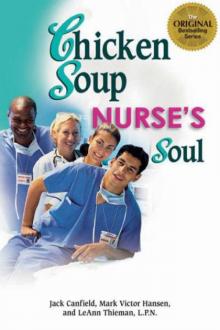 Chicken Soup for the Nurse's Soul: Second Dose
Chicken Soup for the Nurse's Soul: Second Dose Chicken Soup for the Ocean Lover's Soul
Chicken Soup for the Ocean Lover's Soul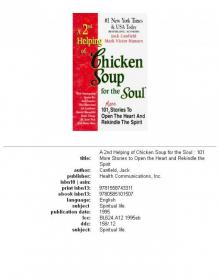 A 2nd Helping of Chicken Soup for the Soul
A 2nd Helping of Chicken Soup for the Soul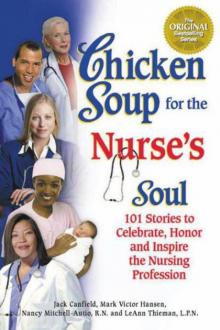 Chicken Soup for the Nurse's Soul
Chicken Soup for the Nurse's Soul Chicken Soup for the Breast Cancer Survivor's Soul
Chicken Soup for the Breast Cancer Survivor's Soul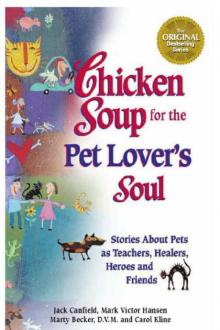 Chicken Soup for the Pet Lover's Soul
Chicken Soup for the Pet Lover's Soul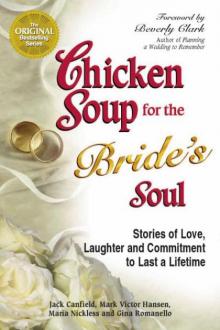 Chicken Soup for the Bride's Soul
Chicken Soup for the Bride's Soul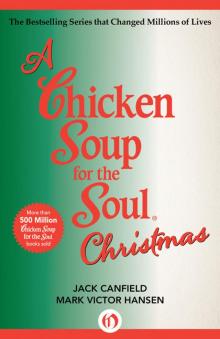 A Chicken Soup for the Soul Christmas
A Chicken Soup for the Soul Christmas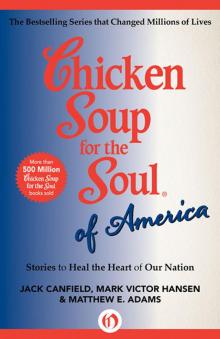 Chicken Soup for the Soul of America
Chicken Soup for the Soul of America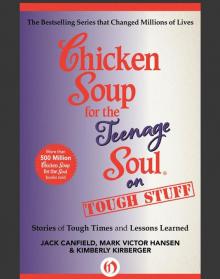 Chicken Soup for the Teenage Soul on Tough Stuff
Chicken Soup for the Teenage Soul on Tough Stuff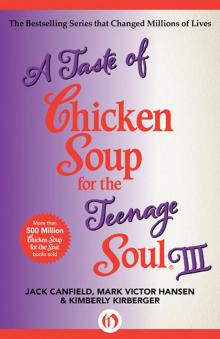 A Taste of Chicken Soup for the Teenage Soul III
A Taste of Chicken Soup for the Teenage Soul III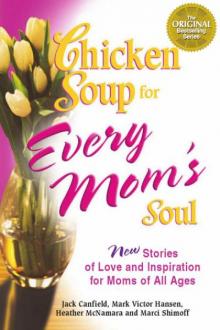 Chicken Soup for Every Mom's Soul
Chicken Soup for Every Mom's Soul Chicken Soup for the Dog Lover's Soul
Chicken Soup for the Dog Lover's Soul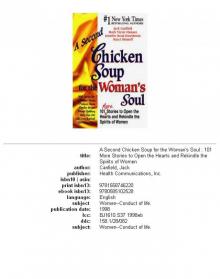 A Second Chicken Soup for the Woman's Soul
A Second Chicken Soup for the Woman's Soul Chicken Soup for the Soul the Book of Christmas Virtues
Chicken Soup for the Soul the Book of Christmas Virtues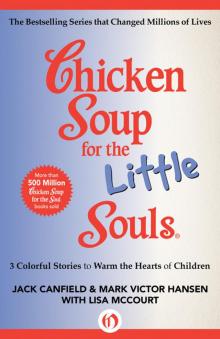 Chicken Soup for the Little Souls: 3 Colorful Stories to Warm the Hearts of Children
Chicken Soup for the Little Souls: 3 Colorful Stories to Warm the Hearts of Children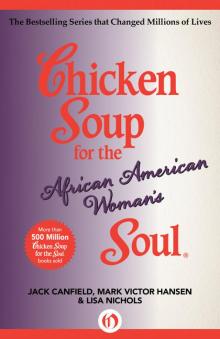 Chicken Soup for the African American Woman's Soul
Chicken Soup for the African American Woman's Soul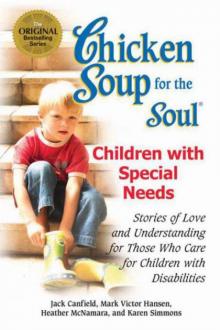 Chicken Soup for the Soul
Chicken Soup for the Soul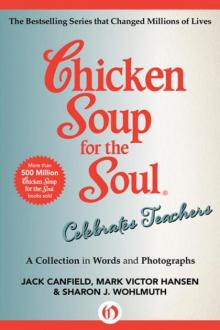 Chicken Soup for the Soul Celebrates Teachers
Chicken Soup for the Soul Celebrates Teachers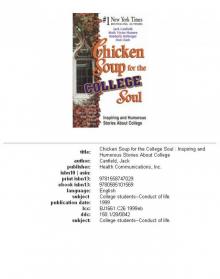 Chicken Soup for the College Soul
Chicken Soup for the College Soul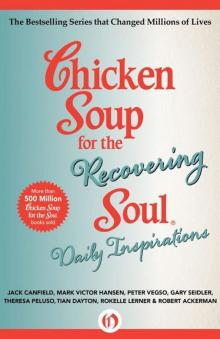 Chicken Soup for the Recovering Soul Daily Inspirations
Chicken Soup for the Recovering Soul Daily Inspirations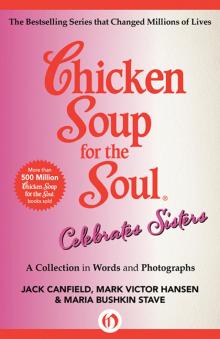 Chicken Soup for the Soul Celebrates Sisters
Chicken Soup for the Soul Celebrates Sisters Chicken Soup for the Dieter's Soul
Chicken Soup for the Dieter's Soul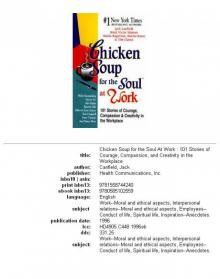 Chicken Soup for the Soul at Work 101 Stories of Courage
Chicken Soup for the Soul at Work 101 Stories of Courage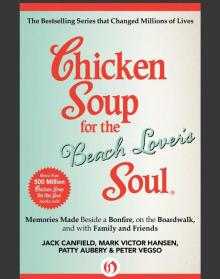 Chicken Soup for the Beach Lover's Soul
Chicken Soup for the Beach Lover's Soul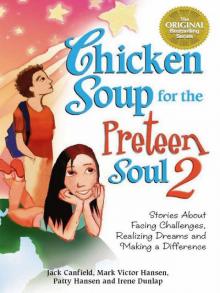 Stories About Facing Challenges, Realizing Dreams and Making a Difference
Stories About Facing Challenges, Realizing Dreams and Making a Difference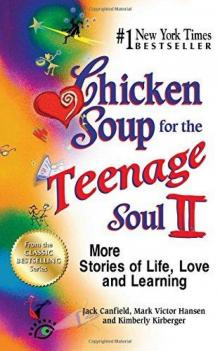 Chicken Soup for the Teenage Soul II
Chicken Soup for the Teenage Soul II Chicken Soup for the Girl's Soul
Chicken Soup for the Girl's Soul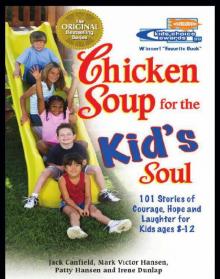 Chicken Soup for the Kid's Soul: 101 Stories of Courage, Hope and Laughter
Chicken Soup for the Kid's Soul: 101 Stories of Courage, Hope and Laughter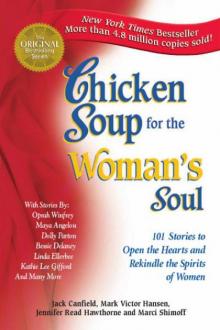 Chicken Soup for the Woman's Soul
Chicken Soup for the Woman's Soul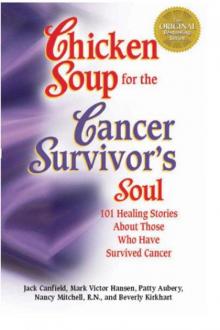 Chicken Soup for the Cancer Survivor's Soul
Chicken Soup for the Cancer Survivor's Soul Chicken Soup for the Canadian Soul
Chicken Soup for the Canadian Soul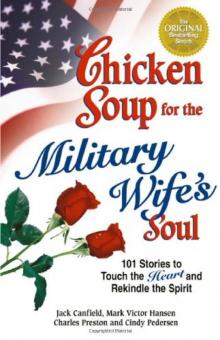 Chicken Soup for the Military Wife's Soul
Chicken Soup for the Military Wife's Soul A 4th Course of Chicken Soup for the Soul
A 4th Course of Chicken Soup for the Soul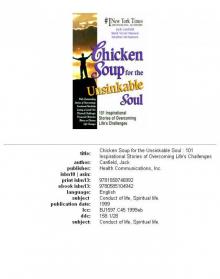 Chicken Soup Unsinkable Soul
Chicken Soup Unsinkable Soul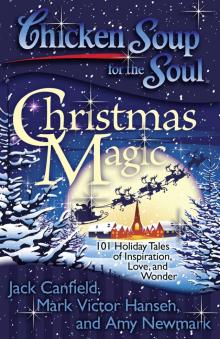 Chicken Soup for the Soul: Christmas Magic
Chicken Soup for the Soul: Christmas Magic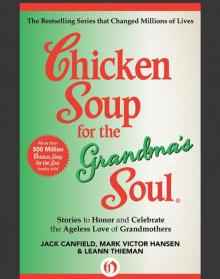 Chicken Soup for the Grandma's Soul
Chicken Soup for the Grandma's Soul Chicken Soup for the Soul: All Your Favorite Original Stories
Chicken Soup for the Soul: All Your Favorite Original Stories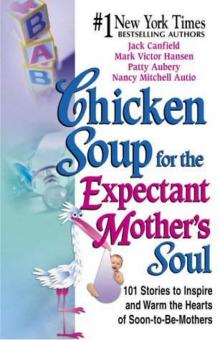 Chicken Soup for the Expectant Mother's Soul
Chicken Soup for the Expectant Mother's Soul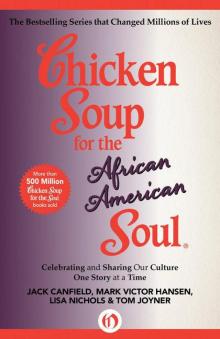 Chicken Soup for the African American Soul
Chicken Soup for the African American Soul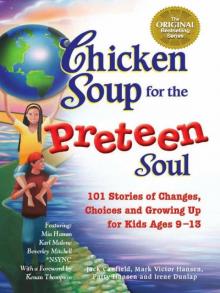 101 Stories of Changes, Choices and Growing Up for Kids Ages 9-13
101 Stories of Changes, Choices and Growing Up for Kids Ages 9-13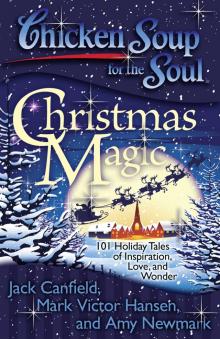 Christmas Magic
Christmas Magic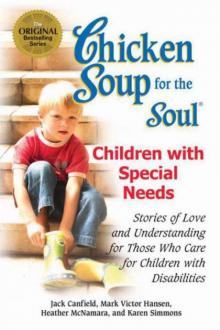 Chicken Soup for the Soul: Children with Special Needs
Chicken Soup for the Soul: Children with Special Needs Chicken Soup for the Soul: Country Music: The Inspirational Stories behind 101 of Your Favorite Country Songs
Chicken Soup for the Soul: Country Music: The Inspirational Stories behind 101 of Your Favorite Country Songs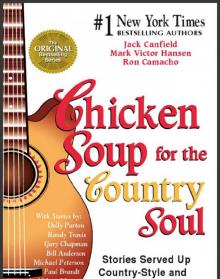 Chicken Soup for the Country Soul
Chicken Soup for the Country Soul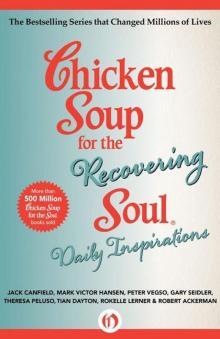 Chicken Soup for the Recovering Soul Daily Inspirations (Chicken Soup for the Soul)
Chicken Soup for the Recovering Soul Daily Inspirations (Chicken Soup for the Soul)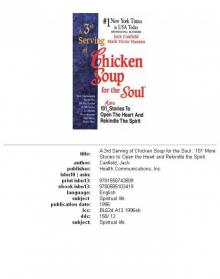 A 3rd Serving of Chicken Soup for the Soul
A 3rd Serving of Chicken Soup for the Soul The Book of Christmas Virtues
The Book of Christmas Virtues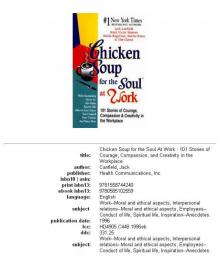 Chicken Soup for the Soul at Work
Chicken Soup for the Soul at Work Chicken Soup for the Soul 20th Anniversary Edition
Chicken Soup for the Soul 20th Anniversary Edition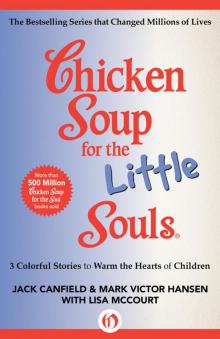 Chicken Soup for the Little Souls
Chicken Soup for the Little Souls Chicken Soup for the Soul: Reader's Choice 20th Anniversary Edition
Chicken Soup for the Soul: Reader's Choice 20th Anniversary Edition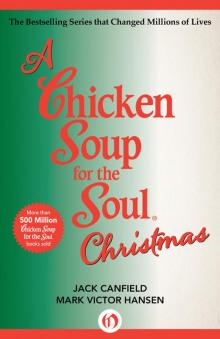 Chicken Soup for the Soul Christmas
Chicken Soup for the Soul Christmas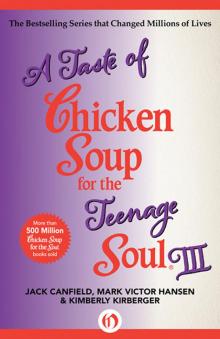 Taste of Chicken Soup for the Teenage Soul III
Taste of Chicken Soup for the Teenage Soul III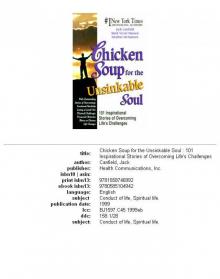 Chicken Soup for the Unsinkable Soul
Chicken Soup for the Unsinkable Soul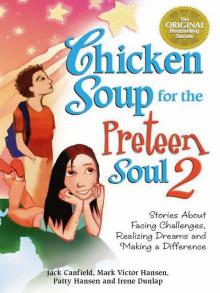 Chicken Soup for the Preteen Soul II
Chicken Soup for the Preteen Soul II